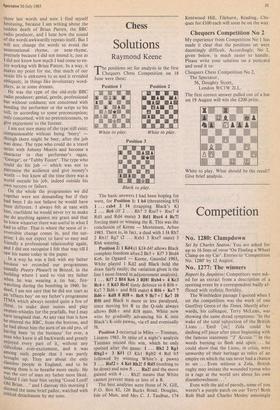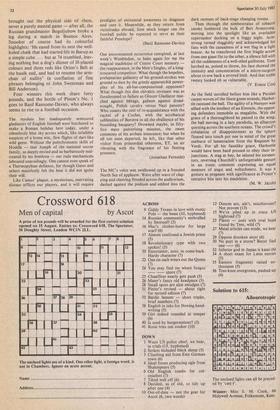No. 1277: The winners
Report by Jaspistos: Competitors were ask- ed for an extract from a description of a sporting event by a correspondent badly af- flicted with stylistic floridity.
The Wimbledon passage 1 quoted when I set the competition was the work of one Geoffrey Green of the Times. Shortly after- wards, his colleague, Terry McLean, was showing the same dread symptoms: 'In the wake of the total subjection of the British Lions ... Emil [sic] Zola could be dashing off piece after piece beginning with the famous statement "1' Accuse." In the words burning to flesh and spirit ... he could show that the Lions, in crisis, were unworthy of their heritage as relics of an empire on which the sun never had a chance
to set Even without a Zola, British rugby may imitate the wounded hyena who in a rage at the world sets about his own disembowelment . . . '
Even with the aid of parody, some of you weren't a purple patch on our Terry! Both Rob Hull and Charles Mosley amusingly
brought out the physical side of chess, never a purely mental game — after all, the Russian grandmaster Bogoljubow broke a leg during a match in Buenos Aires. Snooker of course had its colourful highlights: 'He eased from its nest the well- holed chalk that had started life in Bacup as a simple cube ... but at 74 stumbled, leav- ing nothing but a dog's dinner of ill-placed colours and three reds like Orion's Belt at the baulk end, and had to resume the arm- chair of nullity' (a conflation of fine phrases belonging to John Sweetman and Bill Anderson).
Four winners this week share forty pounds, and the bottle of Pimm's No. I goes to Basil Ransome-Davies, who always seems to rise to a football occasion.
The resolute but inadequately armoured gladiators of English football were butchered to make a Roman holiday here today, under a relentlessly blue sky across which, like infallible auspices of a home win, flew flights of dart-like wild geese. Without the polychromatic skills of Hoddle — that Joseph of the national soccer family, so deeply envied and so barbarously mal- treated by his brethren — our rude mechanicals laboured unavailingly. One cannot even speak of a Thermopylean defiance, for though Gates and others manifestly felt the heat it did not ignite their will.
Like Camus' plague, a mysterious, enervating disease afflicts our players, and it will require prodigies of existential awareness to diagnose and cure it. Meanwhile, as they return from vicissitudes abroad, how much longer can the football public be expected to serve as their faithful Penelope?
(Basil Ransome-Davies)
One uncovenanted occurrence conspired, at last week's Wimbledon, to bake again for me the magical madeleine of Centre Court memory the reappearance, in the Men's Singles, of a long- trousered competitor. What though the hopeless, prelapsarian gallantry of his ground-strokes was ground to dust by the grimly apparatchik power- play of his all-but-computerised opponent? What though this dim chivalric revenant was as foredoomed to failure as Gloster Gladiator mat- ched against Mirage, galleon against dread- nought, Polish cavalry versus Nazi panzers? Who counts the cost of re-acquaintance with the cachet of a Cochet, with the acrobatical sublimities of Borotra in all the ebullience of his bounding basquery? Drowned maybe, in fifty- five mere pulverising minutes, the sweet ceremony of his archaic innocence; but when he all too soon departed, he left, like that other visitor from primordial otherness, ET, an air vibrating with the fragrance of his fleeting presence.
(Jonathan Fernside) The MC's voice was swallowed up in a frenzied North Sea of applause. Wave after wave of clap- ping and cheering flooded across the auditorium, dashed against the podium and eddied into the dark recesses of back-stage changing rooms.
Then through the nimbostratus of tobacco smoke lumbered the bulk of Bert Armstrong, moving into the spotlight like an overladen supertanker docking on a foggy night. Arm- strong turned sluggishly and acknowledged his fans with the casualness of a wet flag in a light breeze. As he transferred the first fragile arrow from one giant fist to the other, a silence fell with all the suddenness of a well-oiled guillotine. Time lurched as, poised to throw, his face showed the intensity and concentration of a micro-surgeon about to sew back a severed limb. And that treble twenty looked oh so vulnerable.
(V. Ernest Cox) As the field unrolled before him like a Persian carpet woven of the finest green strands, Harbot- tle caressed the ball. The agility of a Nureyev was allied with the intellect of an Einstein, the oppos- ing defenders immobile as megaliths. With the grace of a thoroughbred he passed to the wing, the ball moving in a lazy parabola, an albatross questing across the southern oceans. The crowd's exhalation of disappointment as the sphere floated into touch put one in mind of the great outburst of lamentation from the Requiem by Verdi. For all his faunlike grace, Harbottle would have been hard pressed to obey their in- junctions. A stag at bay, he saluted his tormen- tors, reversing Churchill's unforgettable gesture in an ironic comment expressing an equal measure of angst and weltschmerz. It was a gesture as pregnant with significance as Proust's tentative bite into his madeleine.
(M. W. Jacob)







































 Previous page
Previous page